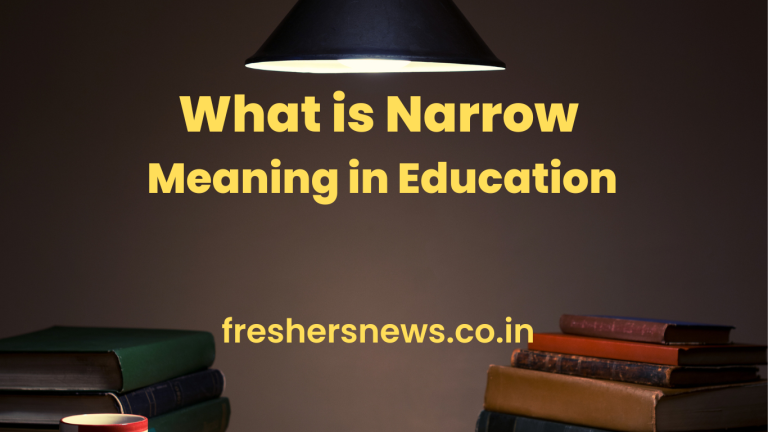Introduction
Education refers to schooling in its narrow meaning. Everything is prefixed, predefined, and organized in this place. Curriculum, teaching strategies, testing procedures, and teachers are predetermined and prefixed. Accomplishing clear educational objectives via classroom teaching is a systematic procedure. Here, we are talking about What is Narrow Meaning in Education.
A student may find suitable work after receiving a credential from these institutes. Thus, formal education may be considered a limited perspective of education.
John Stuart Mill said that education is “the culture which each generation purposefully gives to those who are to be its successors, To qualify them for at least keeping up, and if possible, for raising the level of the improvement which has been achieved” to clarify the narrow meaning of education.
According to S.S. MacKenzie, “education can be interpreted in the narrow sense to mean any consciously directed effort to develop and cultivate our powers.”
Here we are discussing about What is Narrow Meaning in Education:

Education Meaning and Definition
Educare, Educere, Educatum, and E-Duco are the four Latin terms from which the English word “education” has been formed.
Educare: The Latin word ‘Educare’ means to train, shape, nurture, or feed. In other words, it implies that the kid should be raised with a specific goal.
Educere: Educere is Latin meaning “bring forth what is within” and implies to lead out, pull out, or lead out. In other terms, it refers to bringing a child’s hidden abilities to the surface.
Educatum: ‘Educatum’ refers to the actions of instructing. It clarifies the concepts and methods of instruction.
E-Duco: It consists of the letters “E” and “Duco.” ‘E’ stands for out of, and ‘Duco’ signifies guiding or pulling forth a man’s inner might.
Definitions of education given by various educators
Different scholars and philosophers define “education” in a variety of ways. They provide additional insight into the purpose and meaning of education.
Plato’s educational philosophy states, “Man is a composite of his body and spirit. Education must foster a person’s physical and spiritual growth.
Aristotle said education “creates a sound mind in a sound body.”
“Education is the manifestation of the divine perfection already existing in man,” said Swami Vivekananda.
“By education, I mean an all-round drawing out of the best in child and man-body, mind, and spirit,” Gandhi said.
Characteristics of Education with a Narrow Meaning
- The following elements serve as a summary of education’s limited definition.-
- It is a systematic, organized, and planned procedure.
- It is a planned and controlled alteration of the child’s behavior.
- It is delivered at a particular location (School) at a specific time by a person.
- It’s the same as instruction.
- It involves learning new information and abilities.
- It is purposefully organized and controlled mainly by instructors.
- A mature person views it as influencing an immature individual.
- In this situation, kids only receive knowledge and information passively.
- The degree and diploma system is used to gauge one’s level of knowledge.
Is education more specialized than schooling?
What distinguishes education from formal education? –
Therefore, it is clear that schooling and education are not the same thing. Schooling is often the initial phase of formal education, but education is a broader notion encompassing formal and informal ways of learning information.
- In addition to formal education in schools, there are higher education institutions, including universities and graduate programs.
- Because of the pre-scheduled material, administration, and levels that build upon one another, formal education methods, like schools, differ from those of informal education.
- Both formal and informal learning methods are included when referring to education as a whole.
- In summary, schooling refers to the formal education system in schools, while education refers to various formal and informal information sources.
Two Ways of Education: Narrow and Broad
There are two ways to define education: (i) narrowly and (ii) broadly. The precise definition highlights a particular period, such as early childhood education, school education, higher education, etc. It could also refer to a particular kind of education, such as adult, teacher, or technical education.
Any kind of learning experience from birth till death is included in the term “education” in its broadest sense. Age, class, sex, time, and location are not considered limitations on education since it is considered to be lifelong. An elderly man may learn many new things; even a little kid can provide the instructor with educational experiences.
What is the curriculum’s narrow meaning?
Curriculum derives its name from the route that students follow to develop the skills necessary to achieve educational objectives.2.1.2 Curriculum has a specific meaning: In its strictest definition, “curriculum” refers to the conventional course or topics. The curriculum solely covers academic knowledge.2.1.3 The whole definition of curriculum The scope of the modern curriculum is fairly broad.
It is not limited to academic subjects alone. The curriculum is acknowledged to include a syllabus. S.K. Aggarwal asserts that “there is diversity in the curriculum as is in the objectives of education.” In this sense, the term “comprehensive meaning” refers to all of the student experiences and endeavors that contribute to a kid’s social and intellectual growth.
A curriculum is a structured kind of study material provided to meet the demands of the child population.2.2 Curriculum nature Numerous Scholars have defined the curriculum based on their ideas and presumptions.
“Curriculum is the complete life of students to the extent to which the school accepts responsibility for making it good or bad,” claims Kilpatrick. Frobell states, “Curriculum should be conceived as an epitome of the rounded whole of the knowledge and experience of the human race.” In the words of Kanigham, “Curriculum is that medium in the hands of an artist (teacher), by which he can draw his material (students), according to his ideals (objectives) in his art laboratory (school).”
“The curriculum plan must consider the adaptation of studies to the needs of the existing community life,” writes John Divi. “It must select to improve the life we live in common so that the future will be better than the past.” The activities that take place in the lives of kids, their parents, and instructors are all considered by the curriculum, claims Casewell.
A well-thought-out, methodical, integrated, and healthy curriculum may advance learning. The curriculum serves as the cornerstone of education. The magnificence of a large structure is due to its foundation stone. The building will function more efficiently with a more substantial base.
FAQs
How does narrow meaning manifest in educational settings?
Narrow meaning can manifest in various ways, such as rote memorization without comprehension, teaching to the test, or an overemphasis on standardized assessments.
It may involve teaching content without fostering deeper understanding or critical thinking skills in subject-specific contexts.
What are the consequences of narrow meaning in education?
Narrow meaning can lead to surface-level learning, where students may struggle to transfer knowledge to real-world contexts or apply concepts creatively.
It hampers the development of critical thinking, problem-solving, and analytical skills, which are essential for lifelong learning and success in diverse domains.
Narrow approaches may also contribute to disengagement, as students fail to see the relevance or practical applications of their learning.
How can educators address narrow meaning in education?
Educators can promote deep learning by encouraging inquiry-based approaches, critical reflection, and interdisciplinary connections.
Emphasizing conceptual understanding over memorization and fostering a growth mindset can help students develop enduring knowledge and skills.
Incorporating diverse perspectives, real-world examples, and experiential learning opportunities can enrich learning experiences and broaden students’ understanding.
Conclusion
Narrow meaning in education represents a significant challenge that educators must navigate to foster meaningful learning experiences for students. Educators can empower learners to engage critically with content, make connections across disciplines, and apply their knowledge in authentic contexts by transcending surface-level understanding and embracing a more holistic approach. Addressing narrow meaning requires a shift towards pedagogies prioritizing inquiry, critical thinking, and experiential learning, ultimately equipping students with the skills and dispositions necessary for success in an ever-evolving world. As we strive to cultivate a culture of deep learning and intellectual curiosity, confronting and overcoming narrow meaning emerges as a fundamental imperative in pursuing educational excellence and equity.

